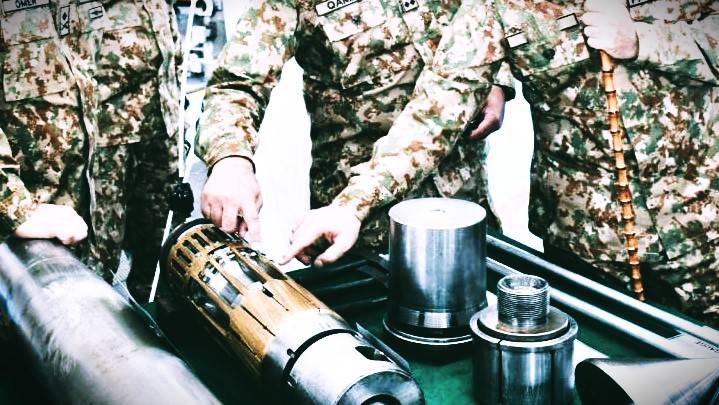
Pakistan has denied that it sold weapons to either Ukraine or Russia despite recent media reports which suggested that arms sold to the US were transported to Ukraine.
This was stated by Foreign Office Spokesperson Mumtaz Zehra Baloch the other day while addressing her weekly news briefing.
During the briefing, she was asked about the reports of Pakistani weapons ending up in Ukraine.
Baloch maintained, "Pakistan has not sold weapons to Ukraine or Russia or that Pakistani weapons are ending up in Ukraine."
She added that Pakistan is not in a position to confirm what weaponry is being used by the parties in the conflict.
"Pakistan’s exports of weaponry to countries are accompanied by end-user certificates, and we expect the parties which import Pakistani weapons to respect those end-user commitments."
Asked whether Russia had recently asked Pakistan to return some of its weaponry, Baloch denied having received such a request.
She also rejected a comparison between the conflicts in Ukraine and the one in Gaza.
Afghanistan, Taliban, TTP, refugees and trade
On the subject of Afghanistan, Baloch defended the country's policy of repatriating Afghan refugees.
"Pakistan’s ongoing policy of repatriation of individuals who are currently here in violation of our immigration laws does not pertain to refugees currently in Pakistan," she said.
In response to another question, she added that Islamabad's decision to repatriate people who violate Pakistan's immigration laws is a decision irrespective of nationality.
"Pakistan believes that it is our sovereign right to implement our immigration laws under which individuals who are staying here illegally can be deported, as is the case in any country in the world. So, we do not need to provide an explanation to countries which have their own immigration laws and that they implement as per their sovereign right."
She assured that the repatriation of all illegal foreigners would humanely take place, with instructions in this regard issued to law enforcement agencies at all levels.
"Helplines have been established, both at the federal level and provincial level," she said, where people can share complaints about misbehaviour of officials.
Regarding refugees being restricted in the transfer of assets, Baloch said that, per Pakistani law, individuals purchasing property must provide documentary evidence of their legal status, including identification documents.
"So, any business concerns which have been acquired through fake documents, or have been acquired in the name of individuals who are not Afghans, will be treated as per Pakistani law," she said, adding that they had seen cases where businesses were being run through informal or benami arrangements or through acquisition of fake Pakistan identity documents.
"This is another violation of Pakistani law, and these issues will be handled as per Pakistan’s laws."
She said a special task force under the Federal Interior Secretary is working to track and identify all such assets.
Moreover, she disclosed that some 58,368 individuals came to Pakistan soon after August 2021 and have since left for other countries. Some of these, she said, left soon after August 2021, and the remaining left in the intervening period. She further said that some countries are still interested in taking some Afghan refugees, and Pakistan remains in discussion with these countries.
In response to a different question, she stated that foreign nationals on Pakistani soil are bound by Pakistani laws.
"Their status does not mean that they are out of the bounds of Pakistani laws."
On the subject of tackling the TTP, she said that Pakistan and Afghanistan remain engaged through various channels, primarily their respective diplomatic missions, to discuss the issue.
"Any positive reports of action against TTP, we hope, will result in concrete results, which means that the terrorist incidents in Pakistan perpetrated by TTP elements with hideouts inside Afghanistan will come down and, in the end, completely eliminated."
She added that Islamabad had shared evidence with Kabul of TTP hideouts inside Afghanistan.
"We have urged the interim Afghan government to take concrete action against these TTP elements, dismantle their networks and prevent terrorist attacks from across the border into Pakistan," she said, adding that Pakistan also wants Kabul to hold the perpetrators and abettors of terrorist incidents inside Pakistan to account.
"We expect Afghanistan to take substantive steps and urgent steps against the terrorist outfits and to dismantle their networks and hold to account all those responsible for terrorist acts inside Pakistan."
On the links between terror attacks and illegal Afghan migrants, she said that Pakistan has concerns that terrorist incidents in recent months have links with terrorist elements which are based in Afghanistan.
"We have also intelligence that many of these terrorist networks have links with some individuals staying illegally in Pakistan."
In response to another question, she said: "Pakistan has always said that we would like to have peaceful relations with all our neighbours, including Afghanistan. And we also believe in the resolution of differences through dialogue."
The people of Pakistan and Afghanistan have historic ties and cultural links, and we cannot wish away our neighbours. We have to live with them and work with them for mutual peace and prosperity.
Regarding transit trade and Afghan containers stuck in Pakistan for inspection, Baloch clarified that Pakistan would continue facilitating transit trade and bilateral trade with Afghanistan. However, she said Islamabad had concerns about the misuse of transit trade facilities with concrete evidence that some of the items destined for Afghanistan on paper are diverted back to Pakistan after being imported by Afghanistan, especially when these luxury items have no use in Afghanistan. "And in that respect, Pakistan has introduced a negative list of products which we believe are luxury items."
She asserted that Pakistan has every right to inspect transit trade containers, as is the right of every customs authority to inspect goods which arrive at its ports.

